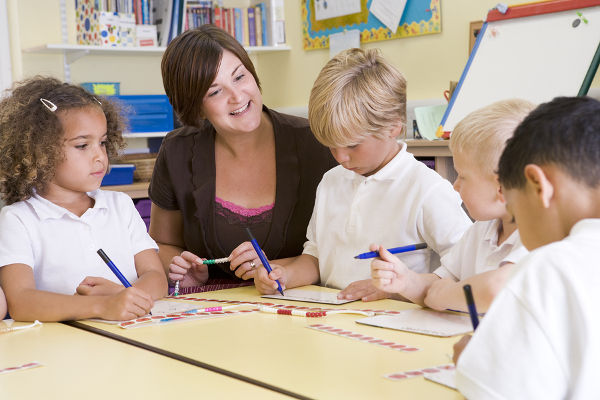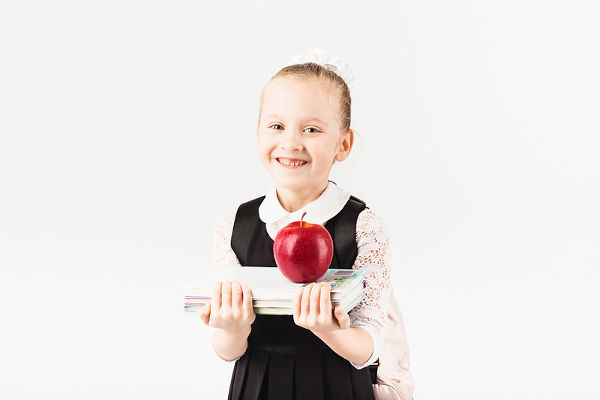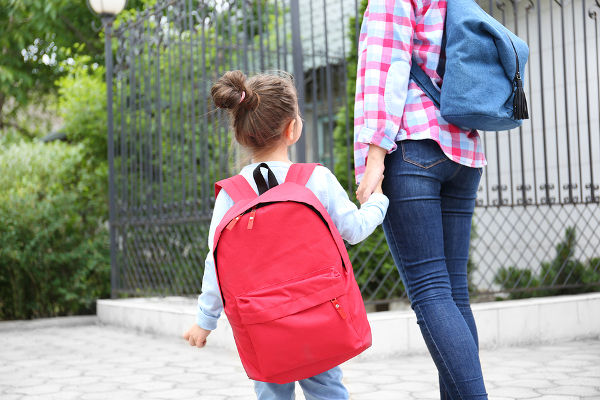We’re more than halfway through August, and many parents are desperately counting down the days until the 4th September when their children return once more to school, when the house will no longer resemble a warzone, when the food bill drops significantly, and when rainy days no longer involve a frantic search for craft activities and a feeling of cabin fever. However, for us parents who have a child starting school for the first time this year, the 4th of September is feeling too close, as it finally becomes clear that our babies are starting to grow up. Cue anguished wails of despair.
Hopefully by now your child will have had a taster session in their new reception class, and will have some idea of what to expect in September. In the meantime, there are lots of things that you can do to ensure your child is ready for this big change.
What Your Child Should Be Able To Do Before Starting School

Every Mum knows that one parent whose child could write perfect letters, read hundreds of words, and recite their times tables before they started reception class. If your child is still struggling with basic pen control then don’t panic. There will be no expectation from your school with regards to your child’s academic skills. Instead, you should focus on making sure your child is proficient at self care.
Toileting
By the time your child starts school, he or she should be able to use the toilet completely independently. This includes wiping and washing hands, and teaching staff will not help your child with this. This can be a struggle, especially for those with summer born children. Practice, however, makes perfect and it is worth taking time during the remainder of the summer holidays to perfect this skill. Make sure you get your child to count out a set number of toilet roll squares for each wipe, as you don’t want any complaints from the school about blocked drains. Explain to your child that if they leave any mess behind then there’s a good chance that they can get ill. Finally, be prepared for some undesirable stains left in underpants.
Some parents like to include a small nappy sack in their child’s bag, with some spare pants and a pocket size pack of flushable wipes, for emergencies. If you do this, make sure your child understands that they would be responsible for cleaning themselves up and that they need to bring home the soiled pants in the bag.
Eating
Your child will need to be able to eat independently. In particular, if your child is having school lunches rather than a packed lunch, he or she should be able to use a knife and fork to eat. Dinner ladies will help cut up some foods if necessary, but generally, your child will be expected to feed themselves without making a big mess. Again, practice makes perfect, and you could consider using a reward chart to encourage this skill to develop. If you have a fussy child, you may find that they are now becoming less reluctant to try new foods, and it would be a good time to start encouraging this. Again, a reward chart may help, with a sticker given each time he or she tries a new or previously disliked food.
Dressing
Your child should be able to dress themselves independently. They will need to be able to change in and out of their PE kit. Even if your child is proficient at dressing themselves in the morning, it would be worth taking the time to practice changing from their uniform into their PE kit and back, especially if you normally lay out clothes for them to wear. This is because in school, it’s likely that their uniform will be left in a crumpled, inside-out state, and this can make it harder for children to put their clothes back on. You can also encourage your child to fold up their clothes into a pile, but focus initially on them being able to dress themselves.
Your child will also need to know how to put their own coat on and shoes. Choose a pair of school shoes with velcro straps. Your child’s teacher won’t appreciate it if you send your child with laces without the ability to tie them!
Preparing To Learn To Read & Write

As we mentioned earlier, your school won’t have any expectations about your child’s academic abilities. However, you can get the ball rolling with fun, and simple activities. Read to your child often. Bedtime stories are a staple in many households, but you can also read during the day, when out and about, such as road signs, menus, etc. Visit your local library for different books. They don’t have to be fiction. For example, if your child loves dinosaurs, see if your library has a dinosaur fact book to borrow. It would also be really helpful if your child can recognise their own name, as they will need to be able to locate their drawer, coat peg, etc.
Some children excel at writing early on, whilst others struggle. Boys in particular develop the upper body muscles needed for good pen control much later than girls. Your child may find trying to write tiring because they lack the muscle strength required. You can help with this by taking them to the park and encouraging them to climb, use monkey bars, etc. At home, ask your child if they will help you sort out your laundry pegs, by pegging them all onto a sheet of card. The action needed to open the peg to clip it to the card uses many of the muscles needed for good pen control, making this a sneaky way of getting in some pen holding practice!
Items That Your Child Will Need For School

Hopefully your school will have provided you with some details on what items you will need to buy for school. Unlike secondary school, most primary schools will supply all of the workbooks, pens, etc. It’s therefore unlikely that you will need to buy a backpack (unless you are sending them with a packed lunch) for your child, but you will probably need to buy a book bag. These are usually available directly from the school and branded with the school’s logo. Always check the bag at the end of each school day, for letters, party invites, homework, etc. Help your child to identify their bookbag by attaching a small keyring to the handle, and writing their name clearly on the side.
You will probably need to buy some school uniform. If you can afford it, it’s worth purchasing five lots of shirts, trousers / skirts, jumpers, etc so you are not having to wash and dry mid week. Your child will get messy, and will probably end up with stains on their clothes. Some schools have strict rules on what uniform can be worn, whilst others are more relaxed and you can often purchase items from supermarkets with non-branded school jumpers available for as little at £2.
You will also need PE kit and a bag to store it in. Some schools supply the bags. Again, it might be helpful to have more than one of each item in case your child loses something, or the kit is needed more than once during the week.
Top Tips For When Your Child Starts School

These simple tips will help make the transition that little bit easier.
Have Snacks Ready
School is exhausting, especially for reception children who are still so young. Have a snack ready at pick-up time to give your child a much needed energy boost. It will also probably help avoid any tantrums.
Be Prepared For Tantrums
Most children hold their emotions in at school and unleash them once they are back with their parents. As your child takes time to adjust to being in school, don’t be surprised if they are a delight in the classroom and a devil at home. In fact, take it as a compliment as it shows how comfortable they are with you. Snacks, and some time after school to relax with cartoons, etc. will help immensely. Many parents report that the Christmas holidays are a particularly bad flashpoint for tantrums. The exhaustion of the first term, coupled with the excitement of Christmas are a dangerous mix.
Preparation Is Key
Do everything the night before. Pack any bags or packed lunches, etc. Lay out the uniform ready. Check the book bag for any notes about what is needed for the next day. Use a calendar or whiteboard to note down any events etc, such as a non-uniform day.
Have Emergency Portable Breakfast Items Available
We have all experienced those mornings when your alarm failed to go off and you then spent 30-minutes arguing with your child about the fact that they couldn’t wear their favourite pair of pants because they were in the wash. Items, such as bananas, pain-au-chocalats, breakfast bars, etc, can be eaten on the way to school and are useful for those mornings when nothing goes to plan.
Have A School Coin Jar
Three-minutes before you are due to leave for school is usually the time when your child announces that they need 50p to buy a cake at a fundraising sale. You were also probably supposed to bake some cakes as well but try not to worry too much about that. These days with contactless payments and mobile phone payments, a lot of us don’t carry a lot of cash. Have a coin jar available with about £10 in coins of various denominations for these last minute requests. It will save you from a lot of stress.
Label Everything
After you spent all that money on the brand new school uniform for your child, you will be dismayed when just one week into the first term he or she returns without their jumper. Make sure everything is labelled clearly. It won’t stop your child losing it, but it will make it easier to identify your child’s lost property when you rummage through the classroom’s lost property bin.
Don’t expect the teacher to find items for you either. He or she has enough to do with marking and lesson prep without adding a search for every child’s lost items. Unfortunately, there’s a good chance that your child will lose several items for good.
Contact With Other Parents
Find out if there is a Facebook or WhatsApp group for the parents of children in your child’s class. If there is, make sure you are in it, and if there isn’t, consider setting one up yourself. That way, when you are not sure if your child needs a PE kit the next day or you want to exchange ideas about costumes for World Book Day, you can quickly send messages to one another.




